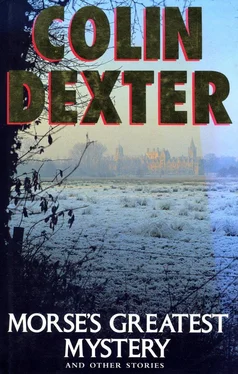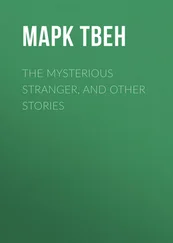“Letters were written — and incidentally I myself would have been far more cautious about those ‘e’s and ‘t’s: twin faults, as it happens, of my very own machine! But, as I say, letters were written — but by Miss van Allen herself; a wedding was arranged; a story concocted of a nonexistent carriage into which there climbed a non-existent groom — and that was the end of the charade. Now, it was you, Sherlock, who rightly asked the key question: cui bono? And you concluded that the real beneficiary was Wyndham. But exactly the contrary is the case! It was the mother and daughter who intended to be the beneficiaries, for they hoped to rid themselves of the rather wearisome Mr. Wyndham — but not before he had been compelled, by moral and social pressures, to make some handsome money-settlement upon the pair of them — especially perhaps upon the young girl who, as Dr. Watson here points out, could well have done with some decent earrings and a new handkerchief. And the social pressure I mention, Sherlock, was designed — carefully and cleverly designed — to come from you . A cock-and-bull story is told to you by some wide-eyed young thing, a story so bestrewn with clues at almost every point that even Lestrade — given a week or two! — would probably have come up with a diagnosis identical with your own. And why do you think she came to you, and not to Lestrade, say? Because ‘Mr. Sherlock Holmes is the greatest investigator the world had ever known’ — and his judgements are second only to the Almighty’s in their infallibility. For if you, Sherlock, believed Wyndham to be guilty — then Wyndham was guilty in the eyes of the whole world — the whole world except for one, that is.”
“Except for two,” I added quietly.
Mycroft Holmes turned his full attention towards me for the first time, as though I had virtually been excluded from his previous audience. But I allowed him no opportunity of seeking the meaning of my words, as I addressed him forthwith.
“I asked Holmes a question when he presented his own analysis, sir. I will ask you the same: have you in any way verified your hypothesis? And if so, how?”
“The answer, Dr. Watson, to the first part of your question is, in large measure, ‘yes.’ Mr. Wyndham, in fact, has quite enough money to be in no way embarrassed by the withdrawal of Miss van Allen’s comparatively minor contribution. As for the second part...” Mycroft hesitated awhile. “I am not sure what my brother has told you of the various offices I hold under the British Crown—”
It was Holmes who intervened — and impatiently so. “Yes, yes, Mycroft! Let us all concede immediately that the, shall we say, ‘unofficial’ sources to which you are privy have completely invalidated my own reconstruction of the case. So be it! Yet I would wish, if you allow, to make one or two observations upon your own rather fanciful interpretation of events? It is, of course, with full justice that you accuse me of having no first-hand knowledge of what are called ‘the matters of the heart.’ Furthermore, you rightly draw attention to the difficulties Mr. Wyndham would have experienced in deceiving his step-daughter. Yet how you under-rate the power of disguise! And how, incidentally, you over -rate the intelligence of Lestrade! Even Dr. Watson, I would suggest, has a brain considerably superior—”
For not a second longer could I restrain myself. “Gentlemen!” I cried. “You are both — both of you! — most tragically wrong.”
The two brothers stared at me as though I had taken leave of my senses.
“I think you should seek to explain yourself, Watson,” said Holmes sharply.
“A man,” I began, “was proposing to go to Scotland for a fortnight with his newly married wife, and he had drawn out one hundred pounds in cash — no less! — from the Oxford Street branch of the Royal National Bank on the eve of his wedding. The man, however, was abducted after entering a four-wheeler on the very morning of his wedding-day, was brutally assaulted, and then robbed of all his money and personal effects — thereafter being dumped, virtually for dead, in a deserted alley in Stepney. Quite by chance he was discovered later that same evening, and taken to the Whitechapel Hospital. But it was only after several days that the man slowly began to recover his senses, and some patches of his memory — and also, gentlemen, his voice . For, you see, it was partly because the man was suffering so badly from what we medical men term ‘suppurative tonsilitis’ — the quinsy, as it is commonly known — that he was transferred to St. Thomas’s where, as you know, Holmes, I am at present engaged in some research on that very subject, and where my own professional opinion was sought only this morning. Whilst reading through the man’s hospital notes, I could see that the only clue to his identity was a tag on an item of his underclothing carrying the initials ‘H. D.’ You can imagine my excitement—”
“Humphry Davey, perhaps,” muttered Mycroft flippantly.
“Oh no!” I replied, with a smile. “I persisted patiently with the poor man, and finally he was able to communicate to me the name of his bank. After that, if I may say so, Holmes, it was almost child’s play to verify my hypothesis. I visited the bank, where I learned about the withdrawal of money for the honeymoon, and the manager himself accompanied me back to St. Thomas’s where he was able to view the patient and to provide quite unequivocal proof as to his identity. I have informed you, therefore, that not only does Mr. Horatio Darvill exist, gentlemen, he is at this precise moment lying in a private ward on the second floor of St. Thomas’s Hospital!”
For some little while a silence fell upon the room. Then I saw Holmes, who these last few minutes had been standing by the window, give a little start. “Oh, no!” he groaned. And looking over his shoulder I saw, dimly beneath the fog-beshrouded lamplight, an animated Mr. Wyndham talking to a legal-looking gentleman who stood beside him.
Snatching up his cape, Holmes made hurriedly for the door. “Please tell Mr. Wyndham, if you will, Watson, that I have already written a letter to him containing a complete recantation of my earlier charges, and offering him my profound apologies. For the present, I am leaving — by the back door.”
He was gone. And when, a minute later, Mrs. Hudson announced that two angry-looking gentlemen had called asking to see Mr. Holmes, I noticed Mycroft seemingly asleep once more in his corner armchair, a monograph on polyphonic plainchant open on his knee, and a smile of vague amusement on his large, intelligent face.
“Show the gentlemen in, please, Mrs. Hudson!” I said — in such peremptory fashion that for a moment or two that good lady stared at me, almost as if she had mistaken my voice for that of Sherlock Holmes himself.
Dido attempted to raise her heavy eyes again, but failed; and the deep wound gurgled in her breast.
(Virgil, Aeneid IV, 688–9)
“Get a move on!”
“I’ll get there as fast as I can, sir — I always do.”
“And what’s that supposed to mean?”
Lewis turned left at Carfax, down into the High, and then over Magdalen Bridge, car siren wailing, before driving past the Asian grocers’ shops and the Indian restaurants in the Cowley Road.
“I mean,” replied Lewis finally, “that here we are with another murder, and you ’ll get there, won’t you? You always do.”
“Nearly always,” conceded Morse.
“And I won’t. I’ve got a second-class mind—”
Читать дальше












